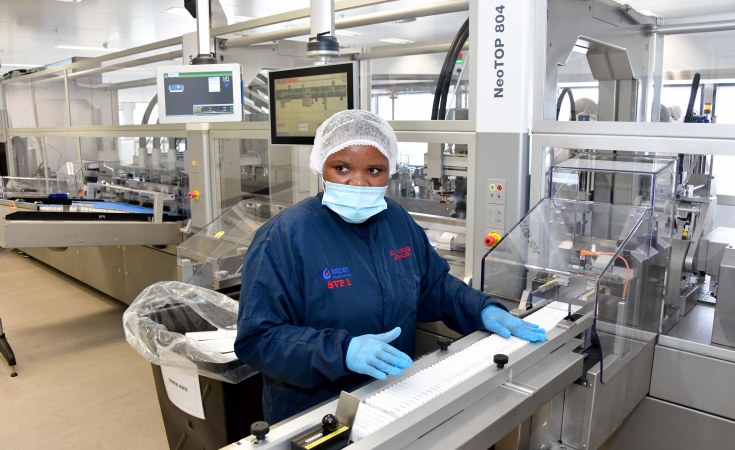Cape Town, South Africa — The Serum Institute of India signed a deal this week with South Africa's Aspen Pharmacare to make four vaccines used in Africa.
The deal has been hailed as saving local vaccine production, which was at risk of shutting down after receiving no orders for a COVID vaccine. But medical aid group Doctors Without Borders says more efforts are needed for vaccines to be fully produced in Africa for Africans.
Four routine pediatric vaccines -- pneumococcal vaccine, rotavirus vaccine, polyvalent meningococcal vaccine and hexavalent vaccine -- will be made in South Africa with products from bulk drug substances supplied by India's Serum Institute.
In addition to the 10-year agreement, South Africa's Aspen Pharmacare also anticipates receiving grant funding from the Bill & Melinda Gates Foundation and the Coalition for Epidemic Preparedness Innovations, CEPI.
"The partnership represents an important step for preventing the kinds of gross inequities of access to life-saving vaccines that emerged during the COVID pandemic," said CEPI's chief executive officer, Richard Hatchett. "We are proud to be part of an effort that will secure critically needed vaccine manufacturing capacity in Africa, for Africa so that it can be ready when it faces future epidemic or pandemic threats."
But Candice Sehoma with Doctors Without Borders' Access Campaign in South Africa is calling for more than just fill-and-finish deals.
"I think it's a great step towards realizing the improvements in the African continent's manufacturing capacity, particularly looking at vaccines. And actually looking into routine vaccines. I think that, for me, is a great step," Sehoma said. "But I think, definitely, we could do with a lot more and even a full sharing of technology, so that we don't find ourselves waiting in line for vaccines that are coming from high-income countries."
Petro Terblanche, managing director of the South African company Afrigen, which reproduced Moderna's MRNA COVID vaccine, says Aspen's deal with the Serum Institute may not be healthy for other companies on the continent, as it could drown out local competition.
"So, the manufacturing capacity and the technology capabilities and the reach of the Serum Institute is very dominant, it is very, very powerful. However, if Serum Institute is prepared to do partnerships with Africa and South Africa for end-to-end manufacturing and technology transfer to Africa, it's a positive development," Terblanche said.
Meanwhile, Dr. Ahmed Ogwell Ouma, deputy director of the Africa Centres for Disease Control and Prevention, says the agreement is an important step for African vaccine manufacturing.
"It has responded to African Union heads of state and government calls that 30 percent of our continent's requirements for human vaccines be procured from Africa manufacturers. And we look forward to this being motivation for more expanded manufacturing of vaccines here on the continent of Africa," Ouma said.
According to the Africa CDC, less than 1% of vaccines currently used on the continent are locally manufactured.
Aspen's Group Communications Consultant Shauneen Beukes says they cannot comment on calls for the full African production of vaccines at this stage.


